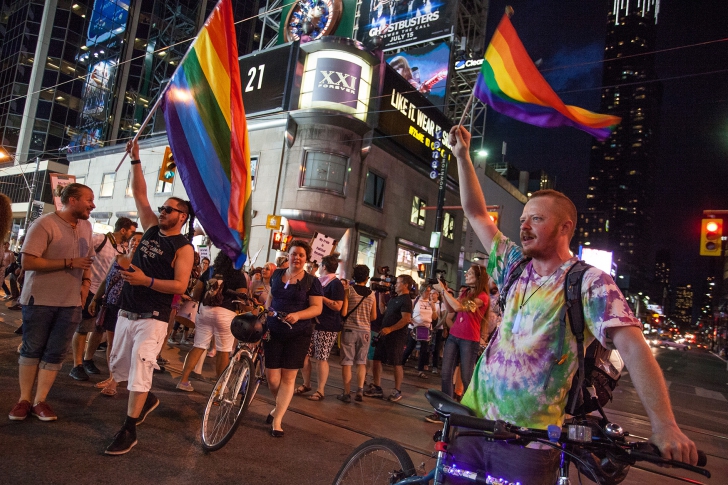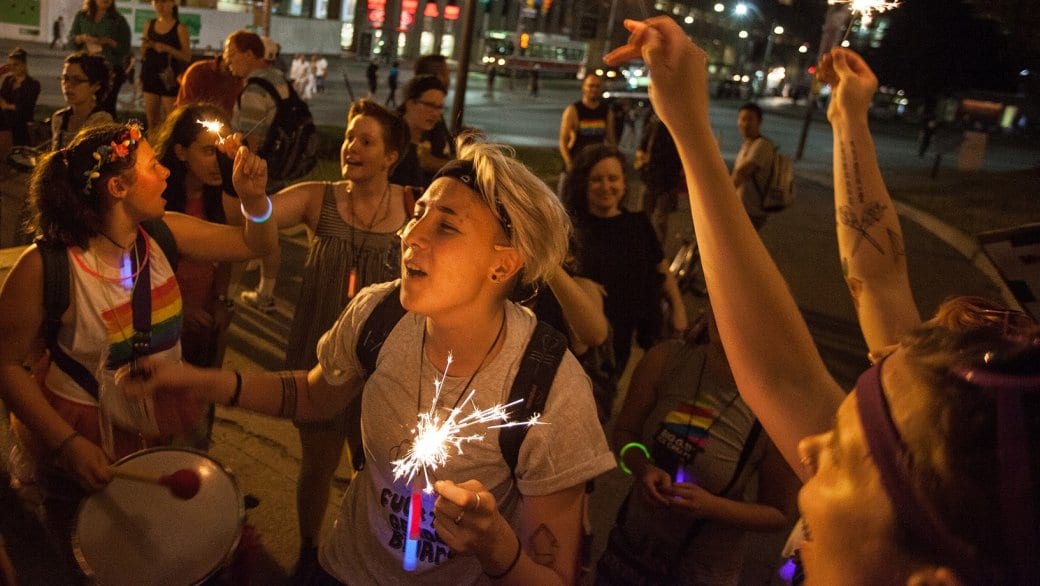As Pride festivities in Toronto make a bigger splash every year, rainbows descend upon the city for an entire month. Banks attempt to outdo one another with rainbow window decals, retailer Winners hands out free Pride flags with its store branding and even Lucky Charms cereal had a float in the Pride parade in recent years. Though we still often hear that “the first Gay Pride was a riot,” where are the queers who take to the streets in protest for their basic human rights?
You’ll find them at the Night March, where hundreds of LGBT community members mobilized in downtown Toronto on the evening of Monday, June 27, 2016. Now in its fifth year, the Night March is an anti-corporate staple during Pride week. Organized by the community for the community, this vocal, energetic and politicized event starts in the Church-Wellesley Village with an open-floor rally. Members of the queer and trans communities are encouraged to share their words on current issues and reconfirm their commitment to keeping Pride as grassroots and as political as possible. The March then snakes its way across the downtown streets, with an undisclosed route that changes annually, and reaches an end-point, often at Old City Hall.

(Nick Lachance/Daily Xtra)
“It’s very much a community initiative. It’s very important that the Night March happens because the political voice at the Pride Parade is becoming increasingly diminished year after year, and this is a night where the actual grassroots activists come together and raise our voices into the night sky about what our issues are,” says Nick Mulé, a member of Queer Ontario and an organizer with the Night March.
Keeping the community mouthpiece central to its core, Night marchers stop at the intersection of Yonge and Dundas where they take a “moment of rage,” and once again, LGBT community members can express their reasons for marching out in the public sphere. Kami Chisholm, a documentary filmmaker who recently released her film Pride Denied: Homonationalism & the Future of Queer Politics, which unpacks the corporate nature of Pride, voiced her concerns with Pride Toronto’s priorities.
“Pride Toronto has directly contributed to the gentrification of the downtown eastside, in collaboration with forces such as the Toronto Police Service’s TAVIS division, which disproportionately affects queer and trans folks,” Chisholm says.
“Pride needs to start prioritizing the needs and voices of sex workers, people of colour, trans people, and other marginalized members of our community who are largely being ignored.”
First-time participant Sheeman Barakzai echoes Chisholm’s anti-corporate sentiments about Pride, and also mentions the recent tragedy in Orlando as her reasons for marching.

(Nick Lachance/Daily Xtra)
“Most of the voices represented at Pride are those of cisgender white able-bodied men. Trans folks, differently-abled, queer black, indigenous, people of colour are grossly underrepresented. My voice is nestled within those that are silenced as queer people of colour, and until our voices and our struggles are represented, our Pride remains political,” Barakzai says.
Following the horrific and senseless losses of lives at Pulse nightclub in Orlando, Florida, the Night March held a special meaning for participants this year. Barakzai recently spoke with closeted queer members of the South Asian community who shared their concerns about showing public support for the Pulse victims on social media, out of fear that they would be outing themselves. “That level of fear for being who you are, that silencing of self, it’s so painful,” Barakzai adds. “It needs to change.”

 Why you can trust Xtra
Why you can trust Xtra


